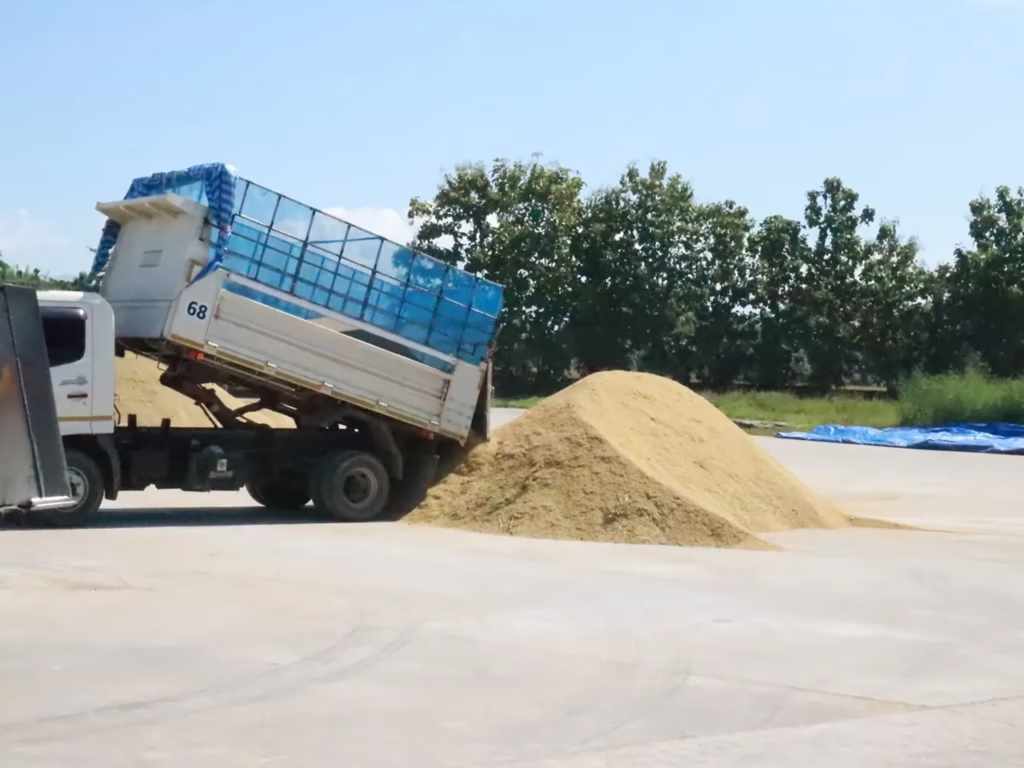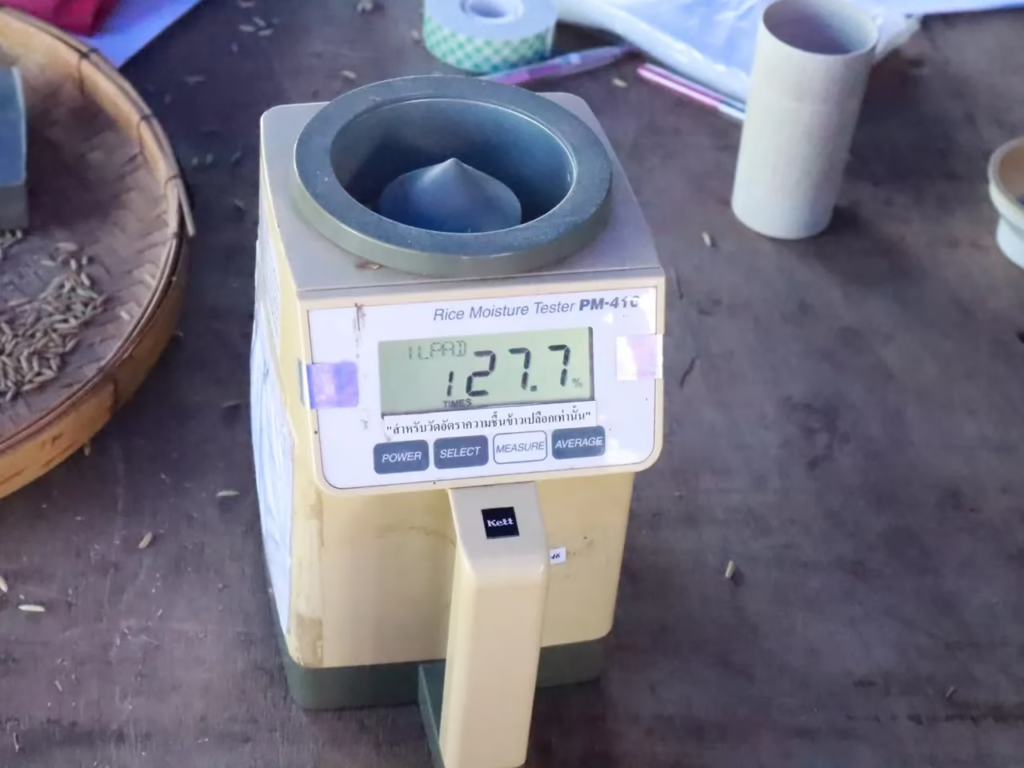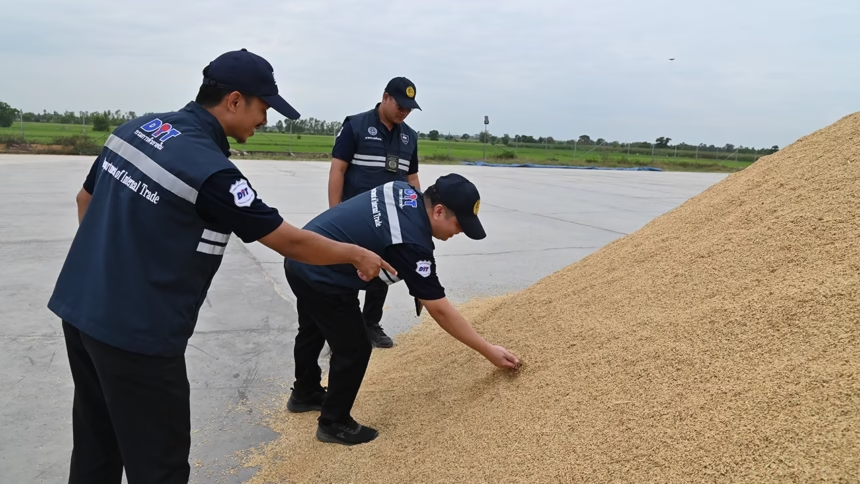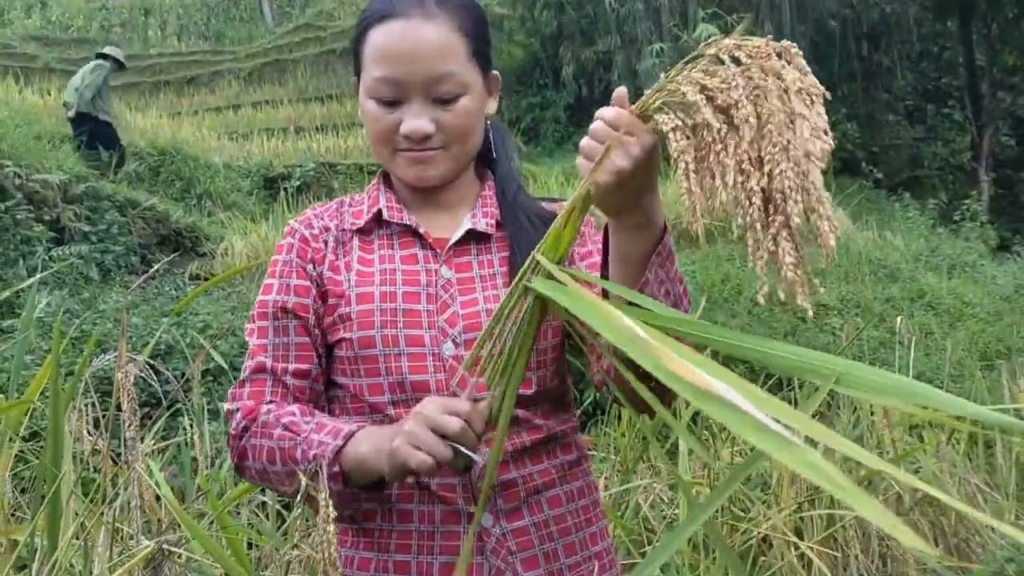CHIANG RAI – The Ministry of Commerce has coordinated with cooperatives to keep buying sticky rice paddy from Chiang Rai without interruption. Officers are on the ground checking weighing scales and moisture meters, and watching posted buying prices, to stop any unfair practice. Anyone found depressing prices or taking advantage of farmers will face legal action.
Ms Yanee Srimanee, Deputy Director-General of the Department of Internal Trade, said the department is following concerns raised by sticky rice growers in Phaya Mengrai district, Chiang Rai, about selling their harvest.
The Chiang Rai Provincial Commerce Office has held urgent talks with local agencies, farmer representatives, and the Phaya Mengrai Agricultural Cooperative, the main buyer in the area. The cooperative continues to purchase sticky rice from farmers, with no pause or refusal, giving growers confidence that they can sell their crop without worrying about market access.

Extra Sales Channels for Sticky Rice
During the peak harvest, the department and the province plan to run sticky rice paddy markets to give farmers an extra sales channel and stronger bargaining power. Two events are set. The first runs from 11 to 13 Nov at Pa Daet Agricultural Cooperative Ltd, Pa Daet district. The second runs from 18 to 20 Nov at Mae Sai Agricultural Cooperative Ltd, Mae Sai district.
On the issue raised by farmers about the Kor Khor 22 rice variety (กข 22) not meeting quality standards due to mutation, which has led to lower prices, local agencies will go into the field to verify the variety and work on solutions. The department will also coordinate with the Rice Department on the related steps.
As of 19 Oct 68, 24% of Chiang Rai’s rice output, or 202,854 tonnes, had reached the market out of a total forecast of 845,225 tonnes. This is made up of sticky rice 539,977 tonnes, 62%, white rice 192,543 tonnes, 22%, jasmine rice 117,540 tonnes, 14%, and Pathum fragrant rice 13,893 tonnes, 2%. Current buying prices for sticky rice at 25 to 30% moisture are 6.70 to 7.30 baht per kilogram.

Inspection of Moisture Meters
The Chiang Rai Provincial Commerce Office has worked with the provincial rice mill association and nearby mill networks to prepare for extra purchasing during peak arrivals. This should lift competition on price, prevent price suppression, and support market stability.
The department confirms it is monitoring sticky rice purchases closely. Farmers can trust that buying is conducted fairly and transparently. Officials from the weights and measures unit are inspecting weighing devices, moisture meters, and price signage to make sure farmers get a fair deal.
If farmers see price cutting, the use of substandard equipment, or suspect unfair conduct, they can file a complaint via the department’s hotline on 1569. Officers will investigate on-site. If offences are proven, strict legal action will follow.
Failure to display prices, or posting incorrect prices, carries a fine of up to 10,000 baht. Intentional price suppression, exploitation of farmers, or breaches of the Price of Goods and Services Act B.E. 2542 can lead to imprisonment of up to 7 years, a fine of up to 140,000 baht, or both.
Sticky Rice Farming in Chiang Rai
Sticky rice farming in Chiang Rai thrives in the cool, high country of the Golden Triangle, where fertile soils along the borders with Laos and Myanmar nurture rare glutinous strains.
Local favourites include Khao Niew Kiew Ngu, known as snake fang sticky rice, and the hardy Hom Naga. Farmers prize these varieties for their fragrant chew, along with strong tolerance to floods, drought, and diseases such as rice blast.
Hill tribe communities, including the Karen, keep to organic wet rice methods on terraced paddies. Seeds are raised in nurseries before the monsoon, when the fields fill with water. Growers then move the seedlings by hand into rich lowland plots across Chiang Rai’s valleys and highlands.
This careful work can yield one to three crops a year, depending on water. It keeps family farms going and feeds eco-tourism, with homestays like Tigerland Rice Farm inviting guests to join planting, weeding, and harvesting as the sun sets over the hills.
Support from the Chiang Rai Rice Research Center has quickened change on the ground. Farmers are turning rice straw into useful products, selling vacuum-packed grains under the Sri Don Mun brand, and even brewing sticky rice craft beers.
In districts such as Phan and Chiang Saen, growers are adopting sustainable practices to raise yields, cut waste, and protect local traditions. These steps align with Thailand’s wider push for hardy, high-value rice that fits both market demand and cultural heritage.
Related News:
Rice Prices Crash in Thailand, Leaving Farmers Facing Tough Choices















